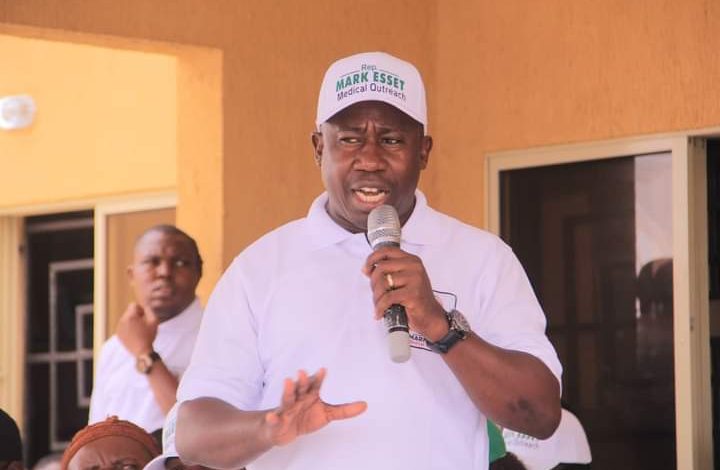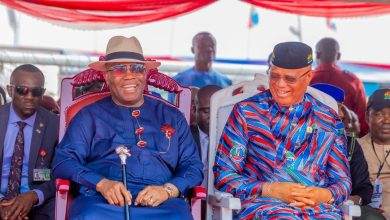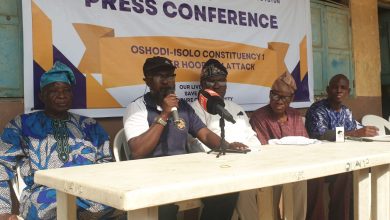Is Mark Esset’s Request On Legislative Elongation In AKS worthy of Consideration?
Mercy Obot

A recent publication in Crest Newspaper with the headline, “Akwa Ibom Should Stop Sending Half-baked Legislators to the National Assembly,” credited to Mr. Mark Esset, has generated a flurry of reactions among Akwa Ibom indigenes on social media and other news platforms.
The National Lawmaker, who represents Uyo/Uruan/Nsit Atai/Ibesikpo Asutan Federal Constituency, has come under interrogation by some individuals who want him to expose the “half-baked legislators” who are in the green and red chambers in the National Assembly in Abuja.
However, it is believed that the intent of Esset in advocating for legislative elongation in the state was grossly misconstrued in the public space, leading to widespread criticism and backlash from the people he seeks to protect.
But does Esset’s plea for a legislative extension for representatives in the National Assembly warrant consideration, by chance? Should he be granted the opportunity to serve his constituency for a third or fourth term in the House of Representatives?”
Before we haul stones at him with our comments, it is imperative to have a full grasp of his motivation and reasons for seeking to go beyond the previous terms his predecessors in the Federal House had earned.
Having conversations with a cluster of journalists at his residence in Uyo, Esset lamented how some members of the House of Representatives enjoy more privileges over others due to their higher ranking made possible by the number of tenures done for their various constituencies.
Related: ESIT EKET CHAIRMANSHIP: TURN FOR ZONE C
He observed that their extended tenure in the National Assembly has accorded them greater esteem and recognition, surpassing that of Akwa Ibom lawmakers, who typically serve only for one or two terms. Consequently, most lawmakers from Akwa Ibom are limited in their ability to make meaningful contributions and achieve significant impact in their constituencies.
Esset cited the example of Rt. Hon. Unyime Idem, a two-term Federal Representative from Oruk Anam/Ukanafun Constituency who campaigned for the position of Minority Leader, but his dreams were shattered because he was not qualified by ranking as the lawmaker who later clinched the position is doing his fourth term.
According to Esset, Uyime Idem withdrew from the minority leader’s race because, based on parliamentary tradition, he was a junior member in terms of seniority, being only in his second term in the Federal House, a situation that put him in a disadvantaged position to contest for the position.
He further pointed out that in Cross River State, some lawmakers have served three or four terms, whereas in Akwa Ibom, lawmakers are limited to only two terms, making them the least-ranked members in the National Assembly.
Esset emphasised that in National Assembly politics, the higher your term, the higher your ranking as a lawmaker, noting that some members are currently serving their ninth term and there are no grounds for comparing them to Akwa Ibom lawmakers who are just serving their first or second term.
Regarding life-touching projects, Esset said the high-ranking Members end up impacting the constituencies with lofty projects such as tertiary institutions because they might be awarded projects worth over N25 billion.
The few members who are mostly in Akwa Ibom State bring home mini projects that they can only afford, such as hair dryers, sewing machines, and generators, among other minor items, to their constituencies.
He also noted that the tenure extension provides legislators with more experience and more life-solving contacts and helps them facilitate more life-touching projects for their respective constituencies.
With these interesting arguments, can we conclude that Akwa Ibom has been producing “half-baked or inexperienced legislators” in the National Assembly due to their apparent restricted tenure?
Perhaps if federal lawmakers were given the opportunity to extend their tenures beyond the second term, there would have been more rural development across the 31 local government areas in the state.
Therefore, Mark Esset’s advocacy for extending legislative tenure at the Federal House deserves careful consideration, rather than throwing his request or candid view into the wind.
Despite the challenges, Esset reiterated his commitment to enhancing the living standards of his constituents through the provision of basic social amenities.
Rolling out his achievements for one year, he said he has presented a bill on the Higher National Diploma (HND) Discrimination (Prohibition) Bill, 2023 and also moved motions on the need to renovate the Federal Science and Technical College at Ukana Offot in Uyo and a call to review the high cost of international flights in Nigeria, among others.
In terms of capacity building, Esset has trained 200 women and youth on animal feed production with an empowerment fund, 100 artisans and small-scale kaolin mining with an empowerment of N5 million, as well as financially empowering five male constituents in palm oil businesses.
The Federal Lawmaker flagged off a three-day comprehensive medical outreach in Uyo and Ibesikpo Asutan Local Government Areas. Subsequently, the medical outreach will be done in Nsit Atai and Uruan Local Government Areas.
As a firm advocate of the A.R.I.S.E Agenda, Esset has facilitated some rural projects, including 4.5 km of Ibakang-Ikot Ukpong-Ikot Obon roads with street lights in Nsit Atai LGA.
While the lawmaker is thriving to create positive impacts in his constituency, it becomes essential for the indigenes of
Akwa Ibom to familiarise themselves with the parliamentary system at the National Assembly.
This knowledge will enable them to make informed decisions and have thoughtful consideration about possibly extending the tenure of federal lawmakers, especially if they are visionary and committed to serving their constituents with impactful and results-driven representation.




